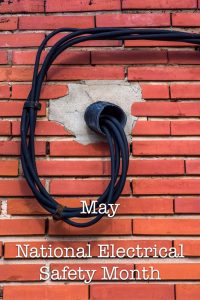

Wishing all our Mother’s a very special Happy Mother’s Day
Electrical Safety
Lithium-Ion Battery Safety
HOW TO SAFELY USE LI-ION BATTERIES
Lithium-Ion powered devices are everywhere. If you have a rechargeable device, it is probably powered by a lithium-ion (li-ion) battery. These batteries are safe if used correctly but if you use or charge devices that are not listed or certified by testing labs, or if you dispose of the battery or device incorrectly, you may be risking a fire.
LI-ION BATTERIES ARE EVERYWHERE
Devices that commonly use Li-Ion batteries include, but are not limited to:
• Laptops
• Cellphones
• Wireless Headphones or Earbuds
• Portable Battery Packs
• Toothbrushes
• E-Readers
• Power Tools
• Vapes & E-Cigarettes
• Personal Massagers
• Electric Cars, Bikes & Scooters
WHAT YOU PURCHASE MATTERS
A recent survey by the Electrical Safety Foundation International found that 31% of consumers would purchase a lithium-ion powered device anywhere, including secondhand, at market stalls or flea markets. Additionally, only 25% were aware of nationally recognized safety certification. Using non-certified batteries, chargers, and devices may increase the risk of fires.
WHERE TO BUY
Only purchase batteries, chargers, and devices from reputable retailers that stand by their products. Be aware of online and other marketplaces that may sell counterfeits or non-certified devices.
HOW TO DISPOSE OF DEVICES & BATTERIES
Never dispose of Li-Ion batteries or Li-Ion powered devices in the regular trash or recycling, as this could lead to a fire.
Visit www.CALL2RECYCLE.org to find a local battery disposal center.

